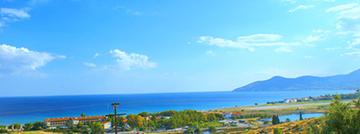More General Topics
- Facts About Greece
- Flag Of Greece
- Greece Climate
- Greece National Anthem
- Greece Olympics
- Greece Time
- Greece Weather
- Greek Army
- Greek Cross
- Greek Flag
- Greek Games
- Greek Government
- Greek Hairstyles
- Greek Name Days
- Greek Nose
- Greek Royal Family
- Greek Sandals
- Greek Time
- Greek Universities
- Greek Zodiac
- Population Of Greece
More Topic Categories
Greece Weather
 The weather in Greece generally has the characteristics of the Mediterranean climate, although because of the peculiar morphology of Greece, several micro – climates and variations occur. In general, temperatures are rarely very high in coastal areas, while the annual and daily temperature range is greatest in enclosed valleys and uplands. Snowfalls are common in mountainous areas from the end of September till March, while in low lands it may snow around December and January. It is uncommon to snow in coastal areas. Heatwaves are very common in low lands and occur mostly in July and August; they rarely last more than three days, though.
The weather in Greece generally has the characteristics of the Mediterranean climate, although because of the peculiar morphology of Greece, several micro – climates and variations occur. In general, temperatures are rarely very high in coastal areas, while the annual and daily temperature range is greatest in enclosed valleys and uplands. Snowfalls are common in mountainous areas from the end of September till March, while in low lands it may snow around December and January. It is uncommon to snow in coastal areas. Heatwaves are very common in low lands and occur mostly in July and August; they rarely last more than three days, though.Greece enjoys more than 250 days of sunshine annually. Rainfall does not last many days even during the winter season. At the end of January or beginning of February, bad weather is interrupted by a period of particularly nice weather, a period that has been known since antiquity as the halcyon days. For example, in the southern islands, temperature may rise beyond 20 degrees Celsius, while Northern Greece may have over 10 degrees Celsius. Moreover, winter season is milder in the Aegean and Ionian Islands than in Northern and Eastern mainland Greece. The hottest season in Greece consists of the last ten days of July and the first ten days of August; during this period, average high temperatures rise to 35 degrees Celsius. The temperatures are rather controlled by the sea breeze in coastal areas as well as by the annual winds blowing in the Aegean, called meltemia.
See Also:
 Athens Photos
Athens Photos
 Santorini Photos
Santorini Photos
 Crete Photos
Crete Photos
 Meteora Photos
Meteora Photos
 Corfu Photos
Corfu Photos

